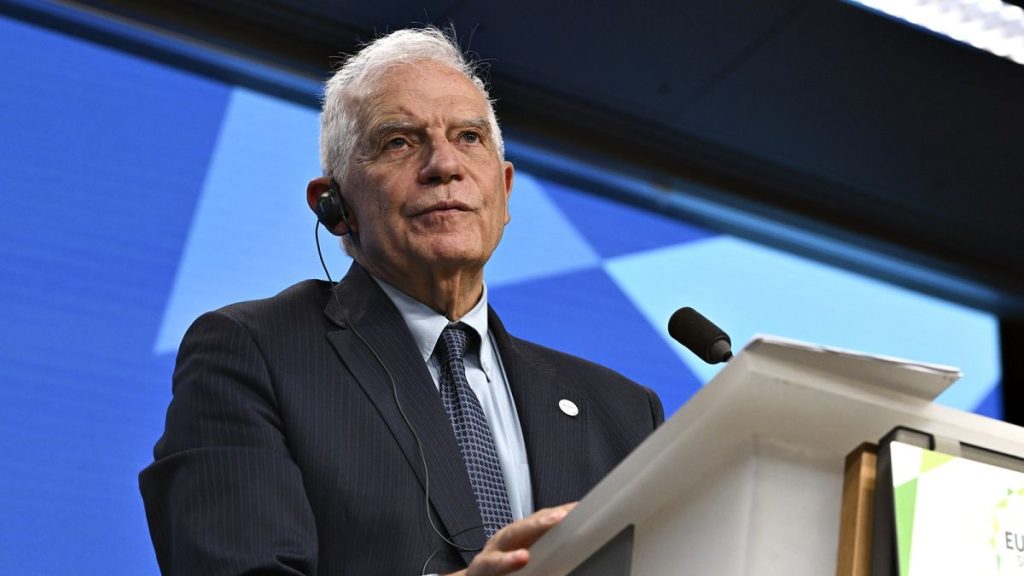Josep Borrell, the European Union’s foreign policy chief, has proposed to formally suspend political dialogue with Israel over the country’s alleged violations of human rights and international law in the Gaza Strip. Borrell’s proposal was first raised during a meeting of ambassadors and will be officially submitted to foreign affairs ministers in Brussels. However, the suspension of political dialogue depends on unanimity among member states, and given sharp divisions over the Israel-Hamas war, the plan is almost certain to fail. Germany, Austria, the Czech Republic, Hungary, Denmark, the Netherlands, Italy, and Greece were among the opposition to the proposal, expressing strong objections.
Many believe that the real objective of Borrell’s proposal may not be the suspension itself, but to force member states to clearly state their stance on Israel’s controversial actions. The proposal is based on the EU-Israel Association Agreement, which contains legally binding provisions on human rights. Earlier this year, Spain and Ireland called for an “urgent review” of the agreement in light of the humanitarian crisis in Gaza caused by Israel’s military campaign. However, this demand faced resistance from countries like Germany, Czechia, Austria, and Hungary, considered staunch supporters of Israel in the EU.
Since the start of the Israel-Hamas war, over 1,700 Israelis and more than 43,000 Palestinians, including over 13,000 children, have been reported killed. Israel has faced criticism for obstructing humanitarian aid and the work of UNRWA, the UN relief agency for Palestinian refugees. Scott Anderson, the director of UNRWA affairs in Gaza, highlighted the challenges faced by civilians in Gaza, emphasizing that even safe zones are not respected by all parties involved in the conflict. Despite the mounting casualties and humanitarian crisis in Gaza, the proposal to suspend political dialogue with Israel is facing significant opposition within the EU member states.
Borrell’s proposal comes as a political signal highlighting the strained relationship between the EU and Israel. It is also intended to push Israel to explain and justify its actions regarding human rights violations in line with the EU-Israel Association Agreement. The proposal is seen as a way to address the escalating humanitarian crisis in Gaza and hold Israel accountable for its conduct in the region. However, given the lack of unanimity among member states and strong opposition from many countries, the likelihood of the proposal succeeding is doubtful.
The sharp divide among EU member states over Borrell’s proposal reflects the complex dynamics within the bloc regarding the Israel-Hamas conflict and human rights violations in Gaza. The opposition from several countries, including those traditionally supportive of Israel, underscores the challenges in reaching a consensus on how to address the situation. The proposal to suspend political dialogue with Israel serves as a litmus test for member states to clarify their positions on the issue, further highlighting the complexities and divisions within the EU’s foreign policy approach towards Israel and the Middle East.
In conclusion, Josep Borrell’s proposal to suspend political dialogue with Israel over human rights violations in Gaza is facing significant opposition within the EU member states. The proposal, based on the EU-Israel Association Agreement, aims to address the escalating humanitarian crisis in Gaza and hold Israel accountable for its actions. However, with strong objections from countries such as Germany, Austria, and Hungary, the likelihood of the proposal being approved is low. The proposal serves as a political signal to highlight the strained relationship between the EU and Israel, as well as to push for accountability and justification for Israel’s conduct in Gaza. Ultimately, the divisions within the EU over this issue reflect the challenges in reaching a consensus on how to address the Israel-Hamas conflict and human rights violations in Gaza.


